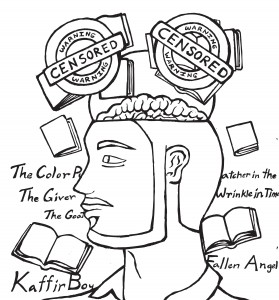
We live in the land of the free, kind of.
It seems odd that in a country where there is freedom of speech and social media being used to catalyze freedom of expression, there is censorship.
When it comes to the activities people enjoy in their leisure time like reading or going on social media websites, some organizations want to limit the options.
Across the country there are local, policies stating what is appropriate for public consumption.
In light of Banned Books Week, from Sept. 22 – 28, and its new counterpart Banned Websites Awareness Day on Sept. 25, it’s rather appropriate to recognize that censorship takes place nationwide.
The Hayden Memorial Library is celebrating this event with a banned books display on the first floor across from the reference desk.
Banned Books Week is meant to put banned and challenged books in the spotlight. Librarians, booksellers, publishers and journalists showcase the books that have been, in a sense, “blacklisted” to celebrate the freedom to read.
Books that have been challenged range from “Grapes of Wrath” by John Steinbeck, for profanity, to “The Scarlett Letter” by Nathaniel Hawthorne, challenged for its conflict with “community values.” American classics like these teach profound lessons about our history.
To say that an American classic like “ The Adventures of Huckleberry Finn” by Mark Twain should be challenged for putting the spotlight on the reality of our history is just foolish.
These books may have content with vulgarity, racial slurs and sexually explicit images, but these books also contain information about the historic background we all come from.
America’s past is not a spotless one. Individuals were being beaten and killed due to their skin color or their sexual orientation. Adultery occurred. Vulgarity was used.
The reality is these things still happen. Hate crimes still occur, spouses still cheat, and vulgarity is not a secret.
History, more often than not, does in fact repeat itself. That being said, why are empowered entities trying to shield people from the history that their ancestors created and that we all get taught in school.
The biggest issue is the depiction of history being written about because it displeases people.
More recently, in 2010 the Merriam-Webster Dictionary was challenged due to its “sexually graphic” definition of “oral sex.”
Challenging a book based on the definition of something that is taught in sex education in classes is outrageous.
Part of growing up and getting an education is learning how to differentiate between useless and worthwhile information. To deprive individuals of this right is a perversion of the educational experience.
Censorship merely provokes an individual’s curiosity, especially children. It is understandable that there are some things that children should not see or read until maturity, but this is not something for the government or any other organizational entity to decide.
Parents are the responsible party when it comes to children, therefore if a parent wants their child to read David Pilkey’s “Captain Underpants,” banned for its offensive language and dubbed “unsuited for age group,” then that is their prerogative.
In a country with so many freedoms, one would think that having the choice of what we can or cannot read would remain uncharted territory, but this is not the case.
Censorship should be a thing of the past. It is 2013, the freedom to seek and to express ideas, even those some consider unorthodox or unpopular, should be prevalent.
As Americans we are lucky to have the freedoms that we have. But what is the use if we don’t take advantage of them.
Instead of allowing our mouths to be covered and our minds to be closed we should make it well known that we know what is best for us and our children, not an outside third party.
So empower yourself and read the banned or challenged books. Don’t allow someone or something tell you what you can’t handle.


